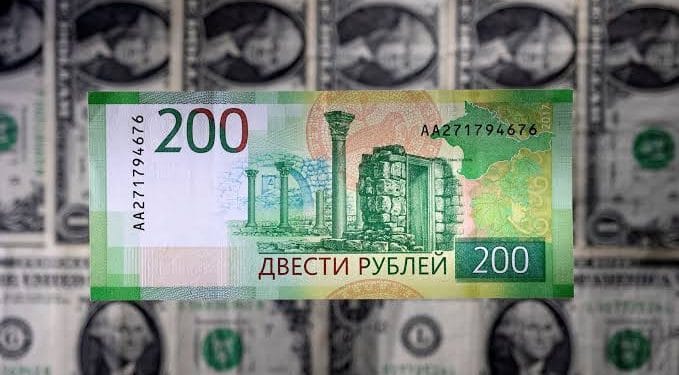Analysts are sure that the fall of the ruble is temporary. It will strengthen due to the sale of foreign currency by exporters
The Russian ruble weakened sharply in turbulent trading on Monday, wiping out some of the previous week’s gains after the central bank decided to ease temporary capital controls aimed at limiting the currency’s fall.
Late Friday, the central bank said it would lift a 12% fee for buying foreign currency through brokerage houses from April 11 and lift a temporary ban on the sale of cash foreign currency to individuals from April 18.
The ruble fell to 82.09 against the dollar at market open in Moscow from 71 rubles hit on Friday, the strongest reading since Nov. 11.
By 07:27 GMT, the ruble was down nearly 5% on the day to 79.90 against the dollar and 4.3% against the euro to 86.35.
The decision to waive the 12% FX transaction fee means that speculators will be able to trade again, Alor Brokerage said, adding that market participants are eager to take even small profits.
The ruble remains supported by the mandatory conversion of 80% of foreign exchange earnings by export-oriented companies, as well as high interest rates, despite the fact that the central bank unexpectedly cut its key rate from 20% to 17% last week.
Analysts at ITI Capital said Russia was generating about $1.4 billion in export earnings per day and the ruble could appreciate even more given Russian capital controls and reduced imports.
The rate cut by the central bank supported OFZ Russian government bonds. The Treasury Department said over the weekend that it would not borrow on local or external debt markets this year.
Finance Minister Anton Siluanov also said Russia would sue if the West tried to force it into defaulting on its sovereign debt.
The yield on 10-year OFZs, which move inversely with their prices, fell to 10.62% on Monday. This was the lowest since February 22, two days before Russia launched a special military operation in Ukraine, prompting unprecedented Western sanctions against Russia.
On the stock market, the dollar-denominated RTS index fell 4.5% to 1031.4 points, but the Russian ruble-based MOEX index rose 0.8% to 2614.0 points, supported by the ruble’s fall.
According to Thomson Reuters









